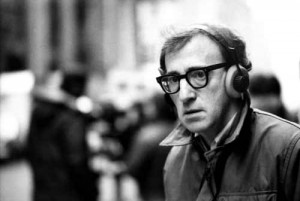Woody Allen: A Documentary presents the life and work of one of the most influential Jewish filmmakers of the past half-century. In a series of interviews, colleagues and peers tell anecdotes and bestow panegyrics on Allen, among them Martin Scorsese, Diane Keaton, Scarlett Johansson, Naomi Watts, and Stephen Tenenbaum.
Unfortunately, few say more than what a “great guy” Allen is and how fantastic it is to work with him. The movie hints at, but misses every opportunity to ask more pertinent questions: How does Allen understand his Jewish background as a source and subject of his humour? Growing up in New York of the 1940s, how did National Socialism shape the neurotic Jewish characters he embodies in his films? What “in the early 1940s” turned him, a happy toddler, into a grumpy child? And why does he type his screenplays on an antiquated German typewriter he compares to a tank, which he believes will outlive him? A cinematographic equivalent of yellow press reporting, the film doesn’t do justice to one of the more subtle and intellectual figures in popular culture. (Woody Allen: A Documentary, directed by Robert B. Weide)
Naomi Lubrich, Media
